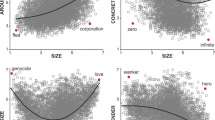Abstract
In this paper, I argue against Davidson's (1986) view that our ability to understand malapropisms forces us to re-think the standard construal of literal word meaning as conventional meaning. Specially, I contend that the standard construal is not only intuitive but also well-motivated, for appeal to conventional meaning is necessary to understand why speakers utter the particular words they do. I also contend that, contra Davidson, we can preserve the intuitive distinction between what a speaker means and what his words mean, even while retaining the standard construal of literal word meaning as conventional.
Similar content being viewed by others
REFERENCES
Davidson, D.: 1979, 'What Metaphors Mean', in S. Sacks (ed.), On Metaphor, University of Chicago Press, Chicago.
Davidson, D.: 1984 'Communication and Convention', in his Inquiries into Truth and Interpretation, Clarendon Press, Oxford.
Davidson, D.: 1986. 'A Nice Derangement of Epitaphs', in E. Lepore (ed.), Truth and Interpretation: Perspectives on the Philosophy of Donald Davidson, Basil Blackwell, New York. Reprinted in A. P. Martinich (ed.): 2000, Philosophy of Language, Oxford University Press, Oxford, pp. 473-483.
Donnellan, K.: 1968, 'Putting Humpty Dumpty Together Again', The Philosophical Review 77.
Green, K.: 2001, 'Davidson's Derangement: Of the Conceptual Priority of Language', Dialectica 55, 239–258.
Grice, H. P.: 1975, 'Logic and Conversation', in P. Cole and J. Morgan (eds.), Syntax and Semiotics, Vol. 3, Academic Press, London.
Hunter, J. P.: 1999, The Norton Introduction to Poetry, W.W. Norton, London.
MacKay, A.: 1968. 'Mr. Donnellan and Humpty Dumpty on Referring', The Philosophical Review 77.
Quine, W.V.O.: 1953, 'On What There Is', reprinted in his From a Logical Point of View, Harper and Row, London.
Reimer, M.: 2001, 'Davidson on Metaphor', in H. Wettstein (ed.), Midwest Studies in Philosophy, XXV, University of Minnesota Press, Minneapolis, pp. 142–155.
Singer, M.: 1977, Citation from The New Yorker, April, p. 59.
Rights and permissions
About this article
Cite this article
Reimer, M. What Malapropisms Mean: A Reply To Donald Davidson. Erkenntnis 60, 317–334 (2004). https://doi.org/10.1023/B:ERKE.0000023383.38025.cd
Issue Date:
DOI: https://doi.org/10.1023/B:ERKE.0000023383.38025.cd




